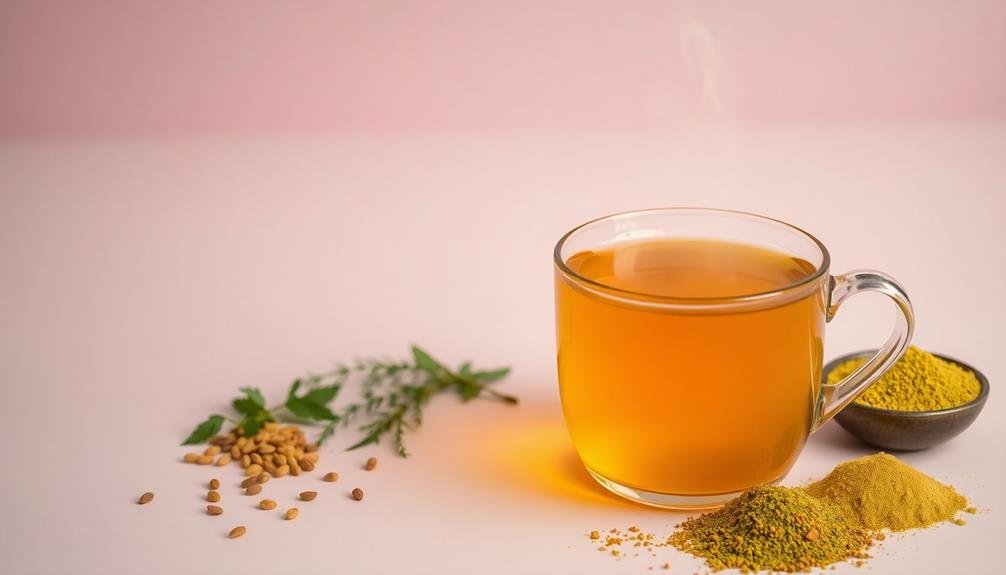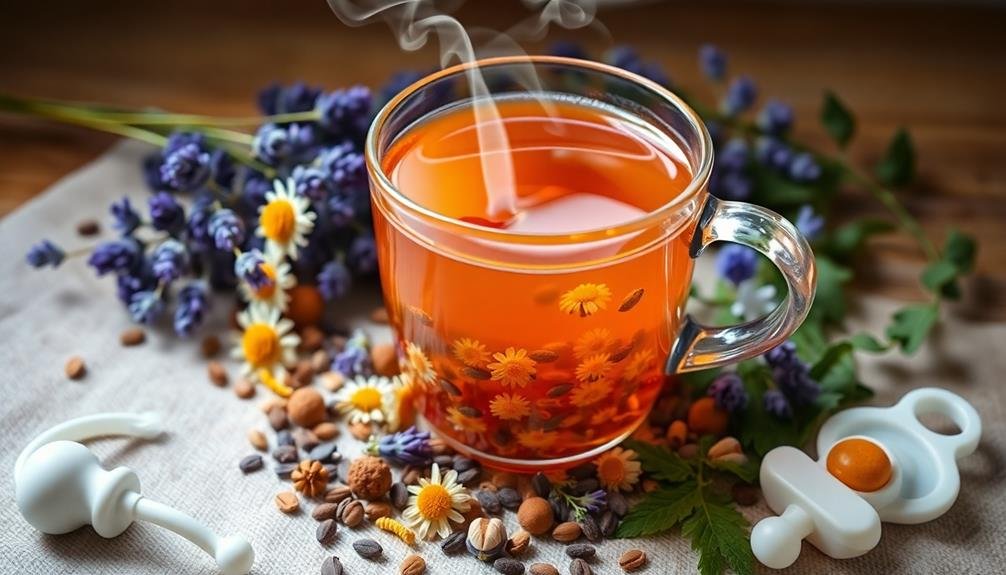Nourishing herbal tea blends can be a game-changer for new moms, offering comfort and potential health benefits during the postpartum period. You'll find key ingredients like fenugreek, fennel, and nettle leaf that may support lactation and replenish nutrients. To create your blend, focus on herbs that aid recovery and milk production, such as red raspberry leaf and moringa. Brew your tea just below boiling and steep for 3-10 minutes, depending on the herbs used. Aim for 2-3 cups daily, starting gradually and monitoring your body's response. Pair your tea with nutrient-rich snacks and balanced meals to maximize its benefits. Discover how to seamlessly incorporate this soothing ritual into your daily routine.
Benefits of Herbal Tea for Postpartum

Brimming with nutrients and natural compounds, herbal teas can offer numerous benefits for new mothers during the postpartum period. These soothing beverages can help replenish essential nutrients, support milk production, and promote overall well-being.
Many herbal teas contain galactagogues, which are substances that can increase breast milk supply. Fenugreek, fennel, and blessed thistle are popular choices known for their lactation-boosting properties. Additionally, certain herbs like red raspberry leaf and nettle leaf can help tone the uterus and replenish iron stores, aiding in postpartum recovery.
You'll find that herbal teas can also provide much-needed relaxation and stress relief. Chamomile and lemon balm, for instance, have calming effects that may help you manage the emotional ups and downs of new motherhood.
Some blends even incorporate adaptogens like ashwagandha, which can help balance hormones and improve energy levels.
Herbal teas are also hydrating, which is essential for milk production and overall health. By sipping on these nourishing infusions throughout the day, you're not only staying hydrated but also benefiting from their unique therapeutic properties.
Always consult with your healthcare provider before incorporating new herbs into your postpartum routine.
Key Ingredients for Lactation Support
Among the key ingredients for lactation support, several herbs stand out for their galactagogue properties.
Fenugreek, a commonly used herb, can increase milk production within 24-72 hours. It's often combined with blessed thistle, which enhances its effectiveness.
Fennel seeds not only boost milk supply but also help reduce colic in babies.
Nettle leaf is rich in iron and calcium, supporting both milk production and maternal health.
Alfalfa, packed with vitamins and minerals, can increase milk volume while nourishing the mother.
Red raspberry leaf tones the uterus and provides essential nutrients for lactation.
Goat's rue, though less common, has been shown to stimulate the development of mammary tissue.
Shatavari, an Ayurvedic herb, balances hormones and supports overall reproductive health.
Moringa leaves are high in iron and calcium, promoting both quantity and quality of breast milk.
When selecting these herbs, opt for organic sources to avoid potential contaminants.
It's essential to consult with a healthcare provider before incorporating new herbs into your diet, especially if you're taking medications or have underlying health conditions.
Preparing Your Herbal Tea Blend

When preparing your herbal tea blend for lactation support, you'll need to carefully select the right combination of herbs.
You'll want to focus on brewing techniques that maximize the potency and effectiveness of your chosen ingredients.
Pay attention to steeping times, water temperature, and storage methods to guarantee you're getting the most benefit from your nourishing tea blend.
Choosing the Right Herbs
Selecting the right herbs is vital for creating a nourishing tea blend for new mothers. You'll want to focus on herbs that support postpartum recovery, milk production, and overall wellness.
Consider including nettle leaf, which is rich in iron and calcium, to replenish nutrients lost during childbirth. Red raspberry leaf can help tone the uterus and ease postpartum cramping.
For milk production, fenugreek and fennel seeds are popular choices. They're known to increase milk supply and can also help with digestion.
Chamomile and lemon balm are excellent for promoting relaxation and reducing stress, which is essential for new moms. If you're concerned about sleep, add some valerian root or passionflower to your blend.
Don't forget about taste. Include herbs like peppermint or spearmint for a revitalizing flavor, or cinnamon for warmth. Rosehips can add a tangy sweetness while providing vitamin C.
Remember to consult with your healthcare provider before incorporating new herbs into your diet, especially if you're breastfeeding. Start with small amounts of each herb and adjust based on your preferences and needs.
Brewing Techniques and Tips
Mastering the art of brewing your herbal tea blend is essential for extracting maximum benefits and flavor. Start by using fresh, filtered water and heating it to just below boiling point. This gentle approach preserves the delicate properties of the herbs.
For loose leaf blends, use one teaspoon per cup of water, or follow the instructions on your tea blend package.
Steep your tea for the appropriate time, typically 5-10 minutes for most herbal blends. Cover the cup or teapot during steeping to retain the volatile oils and beneficial compounds. After steeping, strain the herbs and enjoy your tea while it's still warm.
To enhance your brewing experience, consider these tips:
- Use a glass or ceramic teapot to avoid any metallic taste
- Experiment with cold brewing for a revitalizing iced tea option
- Try adding a touch of honey or lemon to complement the flavors
Proper Brewing Techniques
To brew the perfect cup of herbal tea for new moms, proper techniques are essential. Start by using fresh, cold water and bring it to the appropriate temperature for your herbs. Most herbal teas do best with water just below boiling, around 200°F (93°C). Use one teaspoon of dried herbs or two teaspoons of fresh herbs per cup of water.
Place your herbs in a tea infuser or directly in your cup, and pour the hot water over them. Cover the cup to trap the steam and aromatic oils. Steep for the recommended time, which varies depending on the herbs used:
| Herb Type | Steep Time | Water Temperature |
|---|---|---|
| Delicate | 3-5 min | 175-185°F (79-85°C) |
| Medium | 5-7 min | 185-195°F (85-90°C) |
| Robust | 7-10 min | 195-205°F (90-96°C) |
After steeping, remove the herbs and enjoy your tea. Don't over-steep, as this can lead to a bitter taste. If you're making a larger batch, you can use a teapot or French press. Always store your herbs in an airtight container away from light and heat to preserve their potency and flavor.
Recommended Dosage and Frequency

With your perfectly brewed herbal tea in hand, it's important to understand how much and how often you should drink it. As a new mom, you'll want to maximize the benefits of this nourishing blend without overdoing it. Generally, it's safe to consume 2-3 cups of this herbal tea daily. Start with one cup in the morning and another in the evening, gradually increasing to three if desired.
Remember that everyone's body responds differently, so pay attention to how you feel after drinking the tea. If you notice any adverse effects, reduce your intake or consult your healthcare provider. It's best to space out your tea consumption throughout the day rather than drinking multiple cups at once.
Here are some additional tips for incorporating this herbal tea into your daily routine:
- Drink a cup 30 minutes before or after meals to aid digestion
- Sip slowly and mindfully to fully enjoy the flavor and benefits
- Alternate between hot and iced tea for variety, especially during warmer months
Lastly, if you're breastfeeding, be aware that some herbs may affect milk production. Monitor your supply and adjust your tea intake accordingly.
Potential Side Effects to Consider
While herbal teas are generally safe, it's crucial to be aware of potential side effects, especially as a new mom. Some herbs can interact with medications or affect your milk supply. Always consult your healthcare provider before adding new herbs to your diet.
Be cautious of the following potential side effects:
| Herb | Common Side Effects | Precautions |
|---|---|---|
| Fenugreek | Digestive issues, maple syrup-like body odor | May lower blood sugar |
| Fennel | Allergic reactions, skin sensitivity | Avoid if you have epilepsy |
| Nettle | Mild stomach upset, skin irritation | May interact with blood thinners |
Some herbs can cause drowsiness, so avoid consuming them before driving or operating machinery. If you experience any unusual symptoms, discontinue use and seek medical advice. Remember that even natural remedies can have powerful effects on your body.
Pay attention to your baby's behavior after consuming herbal teas. If you notice any changes in feeding patterns, sleep, or digestion, it may be related to the herbs you're consuming through your breast milk. Keep a journal to track any potential correlations between your tea consumption and your baby's reactions.
Storing Your Herbal Tea Blend

Proper storage of your herbal tea blend is essential for maintaining its freshness and potency. Keep your blend in an airtight container, away from direct sunlight and heat sources. A cool, dark place like a pantry or cupboard is ideal. Glass jars or ceramic containers work best, as they won't impart any unwanted flavors to your herbs.
To guarantee your tea blend stays fresh for as long as possible, follow these guidelines:
- Label your container with the blend's contents and date of preparation
- Store different blends separately to prevent flavor mixing
- Keep your hands and utensils clean when handling the blend to avoid contamination
It's best to use your herbal tea blend within six months to a year for maximum flavor and effectiveness. If you notice any changes in color, smell, or taste, it's time to discard the blend and make a fresh batch.
Remember that moisture is the enemy of dried herbs, so always use a dry spoon when scooping out your tea blend. By following these storage tips, you'll guarantee that your nourishing herbal tea blend remains a comforting and beneficial part of your postpartum routine.
Complementary Foods for Milk Production
While enjoying your herbal tea blend, you'll want to pair it with foods that support milk production.
Consider incorporating nutrient-rich lactation snacks, like oatmeal cookies or energy balls, into your daily routine.
You can also boost your milk supply with hydrating soup recipes and well-balanced postpartum meals that include protein, whole grains, and plenty of vegetables.
Nutrient-Rich Lactation Snacks
Lactation snacks pack a powerful punch for new moms looking to boost their milk production. These nutrient-dense treats are designed to support your body's milk-making efforts while providing essential vitamins and minerals.
You'll want to focus on ingredients known to promote lactation, such as oats, flaxseed, and brewer's yeast. Homemade energy balls are a popular choice, combining nuts, seeds, and dried fruits for a quick and satisfying snack.
You can also whip up a batch of lactation cookies, which often include galactagogues like fenugreek or blessed thistle. For a savory option, consider making your own trail mix with nuts, seeds, and dried fruit.
When choosing or preparing lactation snacks, keep these key points in mind:
- Opt for whole, unprocessed ingredients to maximize nutritional benefits
- Include a balance of protein, healthy fats, and complex carbohydrates
- Stay hydrated by pairing snacks with water or herbal tea
Hydrating Soup Recipes
A warm, nourishing bowl of soup can be a new mom's best friend when it comes to supporting milk production. Not only does it hydrate you, but it also provides essential nutrients that can boost your milk supply. Here are some hydrating soup recipes that are easy to prepare and packed with lactation-friendly ingredients:
| Soup Name | Key Ingredients | Benefits |
|---|---|---|
| Lactation Lentil Soup | Red lentils, carrots, fennel | High in protein, iron, and fiber |
| Creamy Broccoli Soup | Broccoli, oats, nutritional yeast | Rich in calcium and B vitamins |
| Ginger Carrot Soup | Carrots, ginger, coconut milk | Aids digestion and boosts immunity |
| Chicken and Vegetable Soup | Chicken, mixed vegetables, barley | Protein-rich and easily digestible |
These soups are not only hydrating but also provide a variety of nutrients essential for milk production. You'll find that they're easy to make in large batches, allowing you to freeze portions for later use. Remember to drink plenty of water alongside your soup to maximize hydration. By incorporating these nourishing soups into your diet, you'll be supporting your body's ability to produce milk while enjoying comforting and delicious meals.
Balanced Postpartum Meals
Beyond nourishing soups, new moms need well-rounded meals to support their postpartum recovery and milk production. You'll want to focus on nutrient-dense foods that provide a balance of protein, complex carbohydrates, and healthy fats. Aim to include foods rich in iron, calcium, and omega-3 fatty acids in your daily meals.
To boost your milk supply and overall health, incorporate these key elements into your postpartum diet:
- Lean proteins: Chicken, fish, eggs, and legumes
- Whole grains: Brown rice, quinoa, and oats
- Leafy greens: Spinach, kale, and Swiss chard
Don't forget to stay hydrated by drinking plenty of water throughout the day.
You can also include lactation-friendly snacks like oatmeal cookies, nuts, and seeds to keep your energy levels up between meals.
Remember to eat regularly and listen to your body's hunger cues. If you're having trouble preparing meals, don't hesitate to ask for help from family and friends or consider meal prep services.
Alternative Herbs for Lactation Support

Herbs offer a wealth of options for new mothers seeking to support their milk production. While fenugreek and blessed thistle are commonly recommended, you'll find several lesser-known alternatives that can be equally effective.
Consider incorporating goat's rue, an herb traditionally used to increase milk supply. It's particularly beneficial if you're struggling with low production or relactation.
Moringa, a nutrient-dense plant, is another powerful option. It's rich in iron and calcium, which can boost both your milk supply and its nutritional content.
Shatavari, an Ayurvedic herb, is known for its ability to balance hormones and enhance lactation. You might also try alfalfa, which is packed with vitamins and minerals that support overall postpartum health and milk production.
Don't overlook the potential of fennel seeds. They're not only galactagogues but also help soothe digestive issues for both you and your baby.
Finally, consider malunggay leaves, popular in Southeast Asian cultures for their lactation-boosting properties.
Remember to consult with a healthcare professional before adding new herbs to your routine, as they may interact with medications or have contraindications.
When to Consult Your Doctor
While herbal teas can be beneficial for new mothers, it's important to know when professional medical advice is necessary.
Although many herbs are generally safe, some can interact with medications or have unexpected effects on your body. If you're experiencing any unusual symptoms or have concerns about your health or your baby's well-being, don't hesitate to contact your healthcare provider.
You should consult your doctor before consuming herbal teas if:
- You're taking prescription medications
- You have a pre-existing medical condition
- You're experiencing complications during pregnancy or postpartum
It's vital to inform your doctor about any herbal supplements or teas you're consuming, even if they seem harmless.
This information helps them make informed decisions about your care and prevents potential conflicts with other treatments.
Incorporating Tea Into Your Routine

Now that you've consulted with your doctor and received the green light, it's time to make herbal tea a part of your daily routine. Start by selecting a consistent time each day to enjoy your tea. Many new moms find it helpful to brew a cup during their baby's morning nap or as part of their bedtime ritual.
Prepare your tea in a quiet, comfortable space where you can relax and savor the moment. Use a teapot or infuser to steep the herbs for 5-10 minutes, depending on your desired strength. While the tea steeps, practice deep breathing or gentle stretching to enhance relaxation.
Aim to drink 1-3 cups of herbal tea daily, spacing them throughout the day. If you're breastfeeding, consider having a cup shortly after nursing sessions to help replenish fluids.
Keep a thermos handy for on-the-go sipping during errands or outings with your baby. Experiment with different brewing methods, such as cold-brewing overnight for a revitalizing iced tea option during warmer months.
Remember to stay hydrated with water alongside your herbal tea consumption, and listen to your body's cues for ideal intake.
Frequently Asked Questions
Can I Drink This Tea While Pregnant?
You shouldn't drink herbal teas during pregnancy without consulting your doctor first. Some herbs can be harmful to your developing baby. It's best to stick with approved teas or ask your healthcare provider for safe alternatives.
How Long Does It Take to See Results in Milk Production?
You may notice an increase in milk production within 24-72 hours of regular consumption. However, results can vary. Be patient and consistent. If you don't see changes after a week, consult a lactation specialist for personalized advice.
Is This Tea Safe for My Baby Through Breast Milk?
You'll be glad to know that most herbal teas are generally safe for your baby through breast milk. However, it's always best to consult your doctor or lactation specialist before consuming any new herbs while breastfeeding.
Can I Mix This Blend With Other Teas or Beverages?
You can mix this blend with other teas or beverages. However, it's best to enjoy it on its own to fully appreciate its unique flavor and benefits. If you're uncertain, consult the product instructions or your healthcare provider.
Are There Any Lactation-Boosting Teas Available in Ready-To-Drink Formats?
You'll find some ready-to-drink lactation-boosting teas on the market. They're convenient for busy moms, but they're less common than tea bags or loose leaf blends. Check health food stores or online retailers for bottled options.
In Summary
You've now got a wealth of information on creating a nourishing herbal tea blend for your postpartum journey. Remember, every mom's needs are unique, so don't hesitate to adjust your blend or routine as needed. Listen to your body and consult your healthcare provider if you have any concerns. With patience and consistency, you'll find the perfect balance to support your lactation and overall well-being. Enjoy your cup of herbal goodness and embrace this special time with your little one.





Leave a Reply